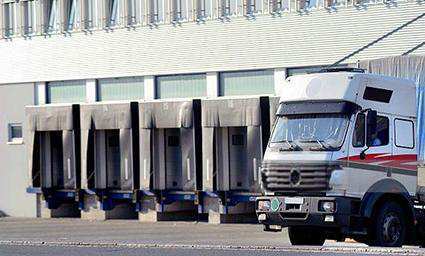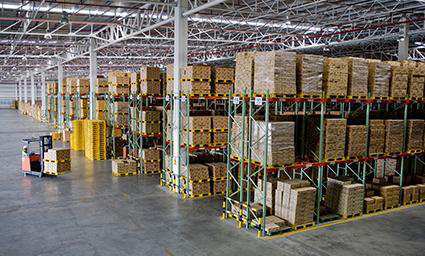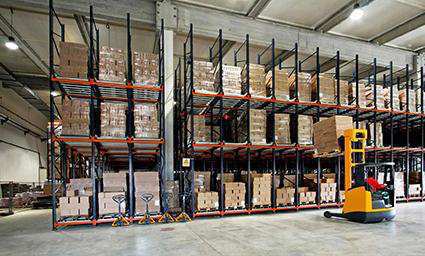
Warehouses can act as habitats for pests, causing serious problems on the premises they reside, the products that are stored within and also for the businesses they serve. These pests can unintentionally be exported via stored goods to numerous other locations compromising reputation and smooth operation of all the businesses that are involved.
With Defon's Integrated Pest Management (IPM) system and through the guidance the company provides for good hygiene practices, success is ensured of every related audit wherever it comes from (internal and/ or external).

Warehouses can act as habitats for pests, causing serious problems on the premises they reside, the products that are stored within and also for the businesses they serve. These pests can unintentionally be exported via stored goods to numerous other locations compromising reputation and smooth operation of all the businesses that are involved.
Food storage warehouses pose additional challenges, as also indicated in the Restaurant, Catering and food industries section.
Reasons to control pest infestations
Some of the most important reasons to control pest infestations, in the entirety of warehouses, include:
- Protecting the health of any person in the premises that could be at risk in a pest-infested environment, by:
- preventing direct transmission of diseases from pests to humans, e.g.
- malaria caused by protozoa of the genus Plasmodium, transmitted via mosquito bites.
- preventing indirect transmission of diseases from pests to humans caused through contamination of water and/ or food and/or surfaces with pathogens, e.g.
- Weil’s disease (leptospirosis) caused by bacteria of the genus Leptospira, transmitted via rodent urine.
- Preventing a loss of merchandise due to damage and/or destruction of them and/or their packaging caused by pests. This category includes the recall cases of infested products, often the entire batch.
- Preventing structural and property damage, e.g.
- rodents may gnaw at wiring causing short circuits and even fire.
- Protecting any person in the premises from the distress caused by pest presence.
- Preventing loss of customers and damage to reputation that occurs when the news of pest presence is communicated, resulting in a further decline of clientele.
- Preventing the imposition of sanctions by the health authorities that range from fines up to suspension of the operating permit and prosecution of the owners.
Pests relevant to this sector
Pests that are frequently detected and cause major problems in this sector are listed below. For additional information refer to section: Pest library.
Rodents (mice, rats)
Stored product insects
Cockroaches
Termites and other Wood-boring insects
Ants
Birds
The solution offered by Defon
Defon, based on years of experience, addresses the above issues by implementing its Integrated Pest Management (IPM) system which is adapted to the specifics of the entirety of warehouses. The following is a general description of this system’s methodology, detailing some characteristic examples.
-
Site survey which focuses on:
- Entry points for pests such as:
- open doors in loading areas.
- inadequacies to structure and proofing of premises, e.g.
- damaged walls by forklifts that additionally create hiding and breeding grounds.
- Hygiene standards, such as cleaning methods and schedules.
- Food preparation, serving and storage areas such as kitchens, canteens, dining rooms, etc. For additional information on this topic refer to Restaurant, Catering and Food industry sector.
- Food spillages from torn packaging which attract pests, e.g.
- grain.
- Bad storage of commodities, e.g.
- pallets or boxes, adjacent to walls which provide hiding and breeding areas for pests (especially for rodents), making inspection and treatments difficult.
Defon recommends at least 30 to 40cm distance to be left between pallets and wall to floor junctions.
- Server and control rooms.
- Public areas such as reception areas and toilets.
- Other areas such as offices, engine rooms, etc.
- Surrounding areas, such as garbage disposal, gardens, garages, etc.
-
Development and implementation of the Action plan.
Here, amongst others, considering warehouse particularities, special emphasis is given on informing clients about the necessary "physical preventative measures", the application of which is highly important. These measures include: good hygiene practices, correct proofing and improvement of facilities, as well as correct storage.
-
Service report submitted within the Report folder.
This report is adapted to suit the needs of any quality management system applied in each warehouse, such as HACCP, ISO 9001, ISO 22000, etc.
This sector presents a high risk of infestations and an increased public health interest. For ongoing protection and detection of infestations from the start, it is proper for pest control contracts to include frequent supervision rather than solely treatments.
In certain circumstances, where necessary and possible, specialized Fumigation services can be carried out, amongst others. These treatments are usually offered for commodities but also for the entire warehouse, if necessary. In certain storage areas, such as silos, fumigation is the appropriate solution.
As part of Defon’s Integrated Pest Management (IPM) system, support can be offered to warehouse personnel through Consultation Services with education and training regarding prevention of pest problems and best hygiene practices.
With Defon's Integrated Pest Management (IPM) system and through the guidance the company provides for good hygiene practices, success is ensured of every related audit wherever it comes from (internal and/or external). This also enhances smooth operation and good business reputation for warehouses whilst keeping health, safety and the environment in mind.






